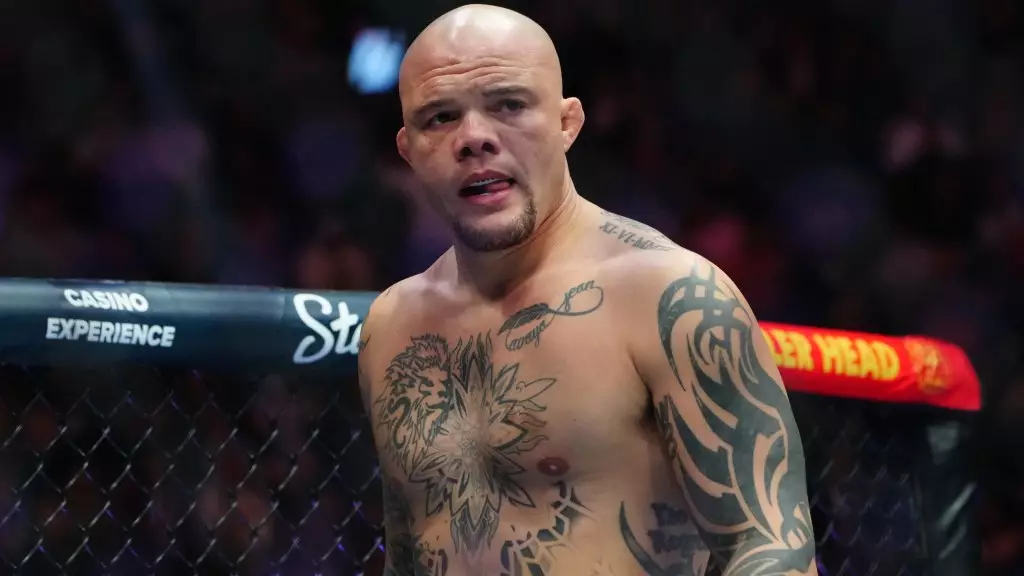The world of mixed martial arts (MMA) is not just about physical prowess; it is profoundly influenced by the emotional resilience and mental fortitude of its athletes. This complexity was strikingly displayed during Anthony Smith’s bout at UFC 310 against Dominick Reyes, where personal turmoil surfaced in a palpable way. Following the loss, Smith’s reflections highlighted a deeper issue that extends beyond the octagon: the mental health struggles athletes often face in the face of loss and injury.
Smith entered T-Mobile Arena with an emotional burden that was evident to those around him. Recently grieving the death of his long-time friend and coach, Scott Morton, “Lionheart” exhibited feelings that overwhelmed even the toughest of fighters. As he walked out to face Reyes, tears streamed down his face, signaling a floodgate of emotions that could not be contained. In an industry that often glorifies stoicism, Smith’s vulnerability was a stark reminder that behind the fighter’s persona lies a human being grappling with intense grief.
The mental aspect of fighting is often discussed in terms of strategy and psychological games; however, emotional trauma can cripple a competitor’s focus and performance. Smith’s candor regarding his mental state before and during the fight shows just how pivotal psychological health is. His admission, “I knew right away it was f*cked. I knew right away, as soon as I got to the arena,” encapsulates the dread and apprehension that can plague even the most seasoned fighters.
During the bout, Smith’s actions reflected an internal struggle that went beyond mere physical limitation. His admission that he “dropped his hands and asked to be punched” demonstrates a disturbing moment of self-doubt and impatience. The fight became less of a competition and more of a desperate plea for validation, as Smith expressed frustration with both himself and his opponent. He found himself caught in a mental loop of comparison and self-critique, saying, “Goddamn, you’re not that good. And then it hit me like, ‘F*ck, maybe I’m not either.’”
This moment of realization is significant not only for Smith but also serves as a broader commentary on the nature of competition. Athletes often define their identities by their performance and the validation they receive from victories. When doubting one’s abilities, the stakes transcend physical outcomes and delve into deeper existential concerns. This juxtaposition illustrates how closely linked success is to self-worth.
In the aftermath of his defeat, Smith contemplated his future in MMA with newfound clarity. With Michael Bisping suggesting a potential farewell fight, Smith acknowledged that he doesn’t want to exit the sport on such a low note. “There’s a circumstance that probably exists where I would do one more,” he stated, emphasizing the need for a “perfect scenario.” This longing for closure indicates that, for Smith, his relationship with MMA is deeply rooted in meaningful connections and experiences, making his potential retirement not just about winning or losing, but about the resonance of his journey.
He articulated a desire for a proper sendoff, one that would allow him to express gratitude towards his supporters and celebrate his career. The desire to have one last meaningful event underscores a universal need for closure, especially in high-stress professions like fighting, where legacies can be inexplicably tied to final performances. Smith’s insight into the nuanced preferences of a fighter’s farewell illustrates the emotional weight of sports and the potential for purpose alongside the inevitable end.
Smith’s experience serves as a critical reminder of the mental health challenges facing athletes today. As the stigma surrounding mental health diminishes, the conversation around emotional resilience in high-stakes environments gains importance. Fighters must grapple not only with physical opponents but with their inner demons. Programs and frameworks that prioritize mental well-being could be integral in helping athletes navigate the pressures of competitive sports.
Anthony Smith’s journey at UFC 310 paints a vivid picture of the emotional and psychological complexities in the life of a fighter. His struggle serves as both a personal tale of loss and a broader commentary on the often-overlooked mental health aspects of professional sports. As athletes like Smith confront their battles, they remind us of the human experience intertwined with the glory of competition.

